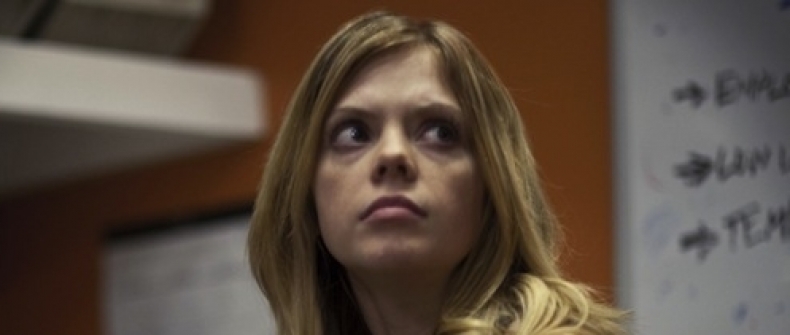
“Compliance”
Approximately nine times out of ten, movies acclaimed for being “provocative” turn out to be merely punishing. Films like In the Company of Men, Funny Games, Dogville, and Irreversible don’t provoke us to think and feel more deeply, they goad us to endure sadism and brutality for as long as possible, then, if we stick it out, they congratulate us for having been as brave and unblinking as the filmmakers. The aim of these films, ostensibly, is to shock us with the inevitability of violence, but the scenarios are almost always too facile, too eagerly worked up for maximum impact, to feel in any way truthful. In the end, they’re just further examples of the inhumanity they purport to illuminate, and the only responses they provoke are the circular, endlessly self-referential film school kind: “Does watching movie violence implicate one in it?” etc, etc.
Craig Zobel, the American writer-director behind the little-seen yet excellent Great World of Sound (2007), has managed the nearly impossible in his new film, Compliance: he has made a provocative movie that is thoroughly humane and decent, that’s filled with compassion for its characters and desperate to understand the disturbing real-life incident at its core. I can’t imagine anyone handling this material more sensitively than Zobel has, except by refusing to depict it at all. And therein lies the film’s challenge: what unfolds is so dismaying, and sometimes so difficult to watch, that many viewers will feel the story needn’t have been told, or that it should have been told more obliquely. That is their right. But as for myself, I believe–now that Zobel has convinced me–that it needed to be told unsparingly, and in as much detail as possible, for it ever to be made sense of. It’s just our good luck that someone as skilled and conscientious as Zobel has done the telling.
The movie is very closely based on an incident that occurred at a McDonalds restaurant in Mount Washington, Kentucky, in 2004. During the dinner rush, the manager received a phone call from a man identifying himself as a police officer. The caller told her that one of her employees, an 18-year-old girl, had robbed a customer and would need to be detained until officers could arrive. Though surprised by the allegations, the manager did as she was told, dragging the girl into a back room and reluctantly subjecting her to a strip search at the caller’s behest. The caller, of course, was no policeman, but the ruse wasn’t detected for another three hours, by which point the girl had been thoroughly debased by several people. Before it was over, she’d been forced to perform a sexual act on the manager’s fiancé.
Though Zobel employs the techniques of fiction, all of the film’s most outrageous details are fact. (If you wish, you can see for yourself via YouTube–security cameras captured the whole thing.) It helps to know this going in, because otherwise we might not believe it. Ultimately, the movie exists in order to make us believe, and it convinces by taking us through the situation step by inexorable step. If you just read the story online or watch the ABC News report, it’s all too easy to assume the manager was an idiot, her staff cowards, the girl a sheep. “I wouldn’t have acted like they did,” we can tell ourselves. But Zobel shows just how insidiously powerful voices of authority are, and how susceptible we all can be to them.
The manager, Sandra (Ann Dowd), is largely sympathetic toward the young cashier, Becky (Dreama Walker), and she frequently questions the need for the harsh treatment, but the man on the phone is so reassuring, and he keeps commending her for being so helpful, for being such a good citizen. Becky, for her part, knows how insane the whole situation is, but she’s young and she’s been conditioned, as we all have, not to question her superiors. Ultimately, there’s no simple reason why anyone in the film does anything, which makes it harder to cast judgment. Part of Zobel’s achievement here–wrought with the assist of the uniformly strong cast–is that he makes the characters’ choices feel both infinitely complex and utterly inchoate, influenced less by rational thought than by an intricate web of invisible forces.
Zobel reportedly learned about the incident while researching the infamous 1963 Milgram experiment, in which test subjects were encouraged to administer increasingly severe electrical shocks to unseen recipients at the command of Yale professors. (The shocks were fake, but the test subjects didn’t know this, and 65 per cent of them obeyed right to the end, administering the highest voltage.) Zobel’s film could easily have been a sort of one-note psych test itself, but such close attention has been paid to the feelings of the characters, and to the subtle crosscurrents of doubt and pity and shame that pass between them, that it becomes, in its small way, a modern-day tragedy–a record of our increasingly broken social contract, and of our continual failure to take responsibility for one another.
It makes perfect sense that the incident occurred in a soulless fast-food chain–here called the Chick-Wich–and Zobel and his cinematographer, Adam Stone, casually illustrate how the environment erodes the characters’ humanity. This isn’t just a matter of heavy-handed close-ups of greasy fries and jumbo sodas, though there are a few of those. It’s more about the whole vibe–the plastic surfaces, the hard fluorescents, the cheery colours turned sickly pale. Visually, Compliance is a horror movie about top-down corporate-America, where disposability is prized over permanence, worker-bee obedience over personal agency.
There’s also a suggestion that age and social class may have played a part. Becky and the other young front-line staff have no interest in staying on at the Chick-Wich–they’re headed for college soon, presumably–and they’re mildly contemptuous of Sandra and the other senior managers for dedicating their lives to the place. Early on, Becky taps away on her smartphone while chatting with a fellow cashier about her sex life, whereupon the much older Sandra tries to join in by sharing info about her own. “Oh, that’s cute,” says Becky, a hint of horror in her voice. We feel Sandra’s humiliation here, and it’s possible to conclude that what happened was at least partly the result of built-up resentment on her part. But Zobel isn’t that reductive–the moment is proffered more as social texture, as an example of the myriad ways we unconsciously isolate ourselves from one other.
Incidentally, Zobel isn’t saying that North American life is uniquely geared to unthinking abuse; you don’t have to look too hard for parallels to, say, Nazi Germany. But he does seem to be saying there’s a uniquely North American style of unthinking abuse, borne out of misguided fealty to our jobs and an eagerness to be superficially upstanding and good rather than truly thoughtful. Towards the end of the film, Sandra is interviewed on television about her part in the incident, and though she’s being raked over the coals she still offers up polite chatter about the weather between takes. She doesn’t see how this need to be agreeable may have contributed to what happened in the restaurant, or how she could be anything other than a victim herself.
I expect a majority of moviegoers will decide to skip this film when they hear what it’s about, and to a degree I can understand their reluctance. Compliance is the opposite of escapism–you can’t exactly look forward to an evening spent watching it. But I’d suggest that the urge to look away from it is not all that different from Sandra’s urge to look away from what actually occurred. And when we look away, when we refuse to contemplate the worst, we ensure that the worst happens again and again.
____
Scott MacDonald writes about cinema for Toronto Standard.
For more, follow us on Twitter: @TorontoStandard and subscribe to our Newsletter














